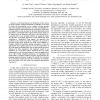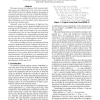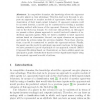725 search results - page 111 / 145 » Learning Behaviors Models for Robot Execution Control |
AIIDE
2009
13 years 9 months ago
2009
Although in theory opponent modeling can be useful in any adversarial domain, in practice it is both difficult to do accurately and to use effectively to improve game play. In thi...
ICRA
2008
IEEE
14 years 3 months ago
2008
IEEE
— Local linearizations are ubiquitous in the control of robotic systems. Analytical methods, if available, can be used to obtain the linearization, but in complex robotics system...
ESTIMEDIA
2006
Springer
14 years 10 days ago
2006
Springer
This paper presents the influence of the loop nest splitting source code optimization on the worst-case execution time (WCET). Loop nest splitting minimizes the number of executed...
ROBOCUP
2004
Springer
14 years 2 months ago
2004
Springer
In competitive domains, the knowledge about the opponent can give players a clear advantage. This idea lead us in the past to propose an approach to acquire models of opponents, ba...
FUIN
2008
13 years 8 months ago
2008
A deterministic behavior of systems composed of several modules is a desirable design goal. Assembling a complex system from components requires also a high degree of re-usability....



